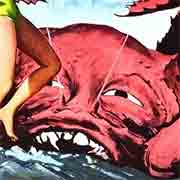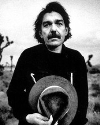|
"Apology"[url posted:http://www.monstersandcritics.com/news/uk/news/article_1623932.php/Libyan-rebels-reportedly-capture-British-special-forces-troops[/url] But yeah, all of the above explanations sounds plausible -- have someone (not too senior) on the ground to have in-person contact with the opposition, but give him a bodyguard detail in case something goes down... even if it's "just" a pro-Gaddafi-forces attack. Oddly, I wouldn't be surprised if the "capture" was because the rebels couldn't be sure just at first glance (read: them being Brits) that these weren't mercenaries in disguise for the regime -- remember the "Arab media" reports that some of the anti-rebel bombing runs were by Serbian pilots.
|
|
|
|

|
| # ? May 22, 2024 01:34 |
|
State TV is in full bullshit mode:quote:State TV says that forces loyal to Gaddafi have recaptured the third city of Misurata and the oil town of Ras Lanuf taken by rebels on Friday. quote:Libyan state TV now showing scenes of crowds celebrating in Tripoli's Green Square and repeating claims that Az Zawiyah, Misurata and Tobruk have all been recaptured by Gaddafi's forces. quote:AFP correspondent reports that Ras Lanuf was still in the control of rebels, countering claims by Libya state TV that it had been recaptured after its loss on Friday. quote:Mohammed Ali, speaks live to Al Jazeera from Misurata. He is a member of the civil committee for Misurata affairs, part of the National Council run by anti-Gaddafi protesters. He says that they are firmly in control of the city and are prepared for any attack by Gaddafi's forces. And more on the road to Sitre: quote:Bashir Abudl Gadir, a rebel commander in east Libya, says that his forces had pushed westwards and now controlled the town of al-Nawfaliyah. Ham, I'd love to hear more about those documents. You don't know of anywhere that's posting details in English do you?
|
|
|
|
Koine posted:Why would the Brits send a "junior diplomat"? "Junior diplomat" sounds suspiciously like intelligence service agent.
|
|
|
|
IM_DA_DECIDER posted:"Junior diplomat" sounds suspiciously like intelligence service agent. Also a reasonable suspicion. Whomever they sent you'd want them to be able to decide if the nominal governing body in Benghazi had actual authority outside the city.
|
|
|
|
IM_DA_DECIDER posted:"Junior diplomat" sounds suspiciously like intelligence service agent. It's also somewhat likely that members of the SAS unit accompanying the 'diplomat' are there to advise and assist the rebel leaders in their strategy and organisation. Obviously this was intended to be very low-profile, for the good of both the rebels and the British government, but looks like whoever blew the whistle and alerted the media hosed up a very good oppurtunity to make substantial ground for the rebellion.
|
|
|
|
farraday posted:Also a reasonable suspicion. Whomever they sent you'd want them to be able to decide if the nominal governing body in Benghazi had actual authority outside the city. Creepy Goat posted:Obviously this was intended to be very low-profile, for the good of both the rebels and the British government, but looks like whoever blew the whistle and alerted the media hosed up a very good oppurtunity to make substantial ground for the rebellion. Why there's a fuckup in revealing this -- gives even barebones credibility to Gaddafi's claims about foreign meddling (so "captured by the rebels" could be a cover story), and who knows if that the "military advisors" role is even doable. Hopefully-fortunately, I expect this story to get very little play in America because it's not involving Americans, and even less play in the United Kingdom for obvious reasons.
|
|
|
|
Creepy Goat posted:It's also somewhat likely that members of the SAS unit accompanying the 'diplomat' are there to advise and assist the rebel leaders in their strategy and organisation. I think you may be reading too much into this. What you're saying would be a big step toward interference in the war, and I doubt that Cameron would have the balls required to make a decision like that on his own, in the secret. And if it was known by a wider circle (the whole cabinet - the lower house - strategic allies), it would have been in the headlines already. There still are lots of foreign civilians trapped in the country, so the primary mission of the entourage may have been to discuss the evacuation of those, as well as other humanitarian matters, with the rebel council. As the situation is chaotic and hard to predict, no diplomat would go in there without some bodyguards. Then there would be secondary goals of finding information about the strategic, political and other situations. But a lot of that sort of information can also be obtained by agents travelling under false identities, like a news crew.
|
|
|
|
I eagerly await the book written by one of the SAS members who has been captured. It's been years since Bravo Two Zero so we're long overdue another "Ex-SAS shocking truth exclusive"
|
|
|
|
Apology posted:I was looking for something a little older because all the recent articles make it sound like another pro-democracy vs. dictatorial government fight, and it's a bit more complicated than that. If you want to know more about the history of Sudan and how/why the South became independent, check out this very good Al Jazeera documentary. https://www.youtube.com/watch?v=7okF15IeSXE&hd=1 One interesting thing that isn't mentioned in the documentary is that originally the british intended for what is now South Sudan to be part of Kenya (which would have made sense since it shares a lot of cultural/ethnic ties with Kenya or even Uganda), then it was supposed to be an independent country. But Egypt, which at the time intended to annex Sudan in it's territory, intervened and convinced the british to give the South to Sudan, even though the 2 regions don't have anything in common other than arabs raiding the South kidnapping people to sell into slavery. By the way, that part of history shaped a lot of the discrimination faced today by blacks in North Sudan and North Africa, where "slave" is a very common pejorative word for black people. It doesn't help that the Nilotic ethnic groups (Dinka, Nuer, etc) which make up the large majority in South Sudan have distinct physical characteristics, like being very tall and having the blackest skin in Africa, so even in North Sudan where an outsider may think Arabs are also black, the Southerners stand out just by how they look. Another interesting fact, Barack Obama's father was from the Luo tribe which is a Nilotic ethnic group that migrated from what is now South Sudan to Kenya a few hundred years ago. Maybe that's why Obama has been taking special interest in South Sudan's independence, pressuring the North in order to avoid a new conflict.
|
|
|
|
Sounds like Gaddafi forces pulled out of Zawiyah again, and have returned again. At the same time Misarata is under heavy attack. To the east it sounds like the rebels got pushed back a bit, but then pushed forward, and retook the ground they had lost. State TV is already claiming they've recaptured Zawiyah, Misarata, and Ras Lanuf, even though mulitple sources have said this isn't the case. State TV is also claiming Tobruk was recaptured, even though it's clearly still held by the rebels. It also sounds like there's some serious military mobilisation going on around Tripoli, heading out to Misarata, probably to capture Misarate before the rebels get past Sirte. The SAS situation appears to be that the British thought it would be a super idea to send a diplomat with SAS protection to talk with the rebels without first telling the rebels they were on their way, leading to them getting captured by the rebels. The rebels have apparently now been in contact with the British government, and the situation should soon be resolved, according to the rebels.
|
|
|
|
Weirdness from Tripoliquote:Volleys of gunfire are still hammering around Tripoli, says the BBC's Jeremy Bowen there. But he says there are questions being asked in Tripoli about the thousands of rounds that have been fired today. "Now, in daylight, it's clear that it is coming from Gaddafi supporters... But before dawn it sounded different, more like a fight. That's how it sounded. Different sorts of guns appeared to be exchanging fire. And later on, a Libyan man came up to me to say that there had been some sort of shootout going on, and the mass firing in the air and the celebrations had been started to cover it up."
|
|
|
|
farraday posted:Because what they really need is someone on the ground to put them in contact with the decision making process, not someone to negotiate for the British government. I doubt the SAS were armed. Wouldn't that be a kind of declaration of war, for a foreign power to put armed soldiers in their borders? It would at least look very, very bad. No, you probably know more than me but I'd be very surprised if they were armed. I would have thought they were used simply for their infiltration type skills. Maybe they made contact with the rebels who decided to arrest them.
|
|
|
|
Troubled Joe posted:I doubt the SAS were armed. Wouldn't that be a kind of declaration of war, for a foreign power to put armed soldiers in their borders? It would at least look very, very bad. I'd be rather surprised if they weren't armed. With the semi-anarchic state the country is in I'd be shocked if the UK (which is an exceedingly practical country when it comes to matters like this) sent someone in without some sort of protection against criminals who would love to take advantage of the situation and kidnap the guy or just rob and kill him. However I'm pretty sure they made contact with the rebel authorities and were taken into custody without resistance and that was likely the plan from the beginning. The rebels couldn't very well let armed foreigners run around with impunity without losing some credibility so they talk up how they "captured" them while it was likely rather more amicable than what is implied.
|
|
|
|
Troubled Joe posted:I doubt the SAS were armed. Wouldn't that be a kind of declaration of war, for a foreign power to put armed soldiers in their borders? It would at least look very, very bad. If they were totally unarmed, the diplomats might have gone by themselves, unless the idea is that men in uniforms project authority or something. But supposing that their mission was to escort a diplomat, they may have been carrying just pistols or submachineguns - something that might help them from being mugged by a mob, but still would not be a good idea to start fighting with a big group of men with rifles and RPG's. Having personal sidearms with them in an area where the national army and police have no presence wouldn't be diplomatically such a big deal as it would be during peace time.
|
|
|
|
Misarataquote:LibyanYouthMovement tweets: "We are getting reports from Misrata that the city is free and they have captured some of the pro gaddafi forces #Libya #Feb17." quote:And LibyaInMe also tweets: "CONFIRMED: #Gaddafi's men backed out of Misrata. 10 killed incl. a 2 yr. 10 of Gaddafi's men have been detained. #feb17 #libya." quote:Now Reuters is quoting a resident of Misrata as saying the rebels have repelled an attack by regime forces on the town. quote:A resident in Misrata gives more details to Reuters of the rebels' success in driving back government forces saying: "The revolutionaries captured 20 soldiers and seized a tank. The town is now fully in the control of the youths." Zawiyah quote:A Libyan expat who lives in Wales tells the BBC he spoke to his mother in Zawiya on Saturday night. The city was under rebel control but surrounded by pro-Gaddafi forces, he said, who were using heavy artillery and "shooting randomly at peaceful protesters and innocent people on the streets, in what they call daily 'hit and run' attacks. Two of my cousins were shot yesterday. One of them is OK but we remain worried about the other one. Two teenagers were also reportedly chased by pro-Gaddafi thugs and hanged in public - just as an example, to put fear into the hearts of the city's people." So is this Gaddafi's tactics? Surround a city and harass the residents each day with tanks and artillery? It sounds like he's try to break the will of the residents using a combination of seiging and hit and run tactics. Brown Moses fucked around with this message at 17:02 on Mar 6, 2011 |
|
|
|
I think, at some point, whether you believe you are right or wrong, you realise that you are having a negative impact on the lives of your people and it would be best if you moved on. When you are shelling them in their homes surely that point has to come.
|
|
|
|
Flayer posted:I think, at some point, whether you believe you are right or wrong, you realise that you are having a negative impact on the lives of your people and it would be best if you moved on. When you are shelling them in their homes surely that point has to come.
|
|
|
|
Flayer posted:I think, at some point, whether you believe you are right or wrong, you realise that you are having a negative impact on the lives of your people and it would be best if you moved on. When you are shelling them in their homes surely that point has to come. That is thinking like a rational person. Gaddafi is not a rational person. To him, HE is Libya and even if every single person in the country turns against him, THEY'RE the traitors.
|
|
|
|
Not sure how legit it is, but the Libyan Interim Transitional National Council has set up a twitter account at LibyanTNC. Their first tweet, four hours ago: quote:By the name of God we start #libya #17feb And in Tunisia, there's worry that their revolution is going to be exploited as they call for more military intervention to stabilize the country. quote:There have been calls for a greater military role to help stabilise post-revolutionary Tunisia, but North Africa analyst Francis Ghiles warns that a military coup would only damage Tunisia's long-term interests. source Turkey's again mentioned as a possible (as well as the best) route they could take, but the country's still in turmoil and trying to sort itself out, so who knows what'll emerge at the end. Narmi fucked around with this message at 18:15 on Mar 6, 2011 |
|
|
|
There is also the issue that he probably does not care about what happens to Libya or the people involved in it as long as he can cling to power (and presumably a life of luxury).
|
|
|
|
lil sartre posted:If you want to know more about the history of Sudan and how/why the South became independent, check out this very good Al Jazeera documentary. The worst part of the Darfur thing happened when I was more focused on myself and pointedly ignoring the news and politics. I'd see one picture of a skinny little kid and automatically change the channel during that time. It's never too late to catch up.
|
|
|
|
In Egypt news, The Egyptians have replaced the Mubarak-era foreign minister with Nabil El-Arabi, his resume includes: -- At first he was a legal adviser for the Delegation that signed the Camp David Accords between Egypt and Israel, but quickly turned against it and became an Opponent of the Accords. -- A veteran lawyer and diplomat, he was responsible for the Legal victory of Egypt that proved Egypts Right to the town of Taba after the israeli's withdrew from the Sinai. -- Ambassador to India. -- He then became a judge on the International Criminal Court. Overall an excellent Choice.
|
|
|
|
Flayer posted:I think, at some point, whether you believe you are right or wrong, you realise that you are having a negative impact on the lives of your people and it would be best if you moved on. When you are shelling them in their homes surely that point has to come. This idea has realized itself just about never in the history of mankind, otherwise there would be no armed conflicts. Abraham Lincoln is still admired by many not because he was a great humanist but because he crushed the rebel armies and burned down their cities. Had he instead allowed the South to secede, he would be remembered as the worst US President ever. Well, apart from GWB.
|
|
|
|
BBC News are reporting on the TV that the SAS guys have been released. The report suggests there were eight people, of which 6 were SF. They landed by helicopter at around 0200 near Benghazi and were arrested after they were found to be carrying weapons, explosives and documents (including passports of multiple nationalities). Libyan State TV has played what it says is a recording of a telephone conversation between the British Ambassador to Libya and a Rebel Commander, where he is talking about what they can do to help "clear up this misunderstanding".
|
|
|
|
Why is the UK government being so belligerent? We don't have strong historical ties there as far as I know and we get comparatively little oil from Libya so why are Cameron and Hague getting involved?
|
|
|
|
Misarataquote:This video has emerged onine in the past few hours, and claims to show the city of Misurata after opposition fighters saw off attacks by Gaddafi's troops. It shows shell-damaged buildings and burnt out tanks. It's on Facebook, so we can't embed it here. To watch it, you'll have to click here. Like the other videos we've been sent via third-party sites, we've got no way of independently verifying its veracity. quote:We're getting reports from Misurata that 16 Gaddafi soldiers, and 18 armed anti-Gaddafi fighters, were killed in today's fighting. There are at least 71 wounded, and nine in critical condition, we understand. The video is worth watching, gives you a sense what the Gaddafi forces are up against. The people of Misarata certaintly don't look defeated to me.
|
|
|
|
A scary unconfirmed report:quote:@ProtestWatch Eyes on Yemen today.ProtestWatch has been fairly accurate and doesn't usually retweet or post things without links, so this caught my attention right away. A clip from a good article about a reporter who came under fire multiple times in Yemen: quote:Normally it started with stone throwing or gunshots in the air. The Saturday I met Ahmed they were shooting right at us. It's a good article and not too long, you should read it: http://www.thestar.com/news/world/article/949519--yemen-both-dangerous-and-beautiful?bn=1 Wahhabi clerics just have to air their pompous opinions: quote:"The Council of Senior Clerics affirms that demonstrations are forbidden in this country. The correct way in sharia (Islamic law) of realising common interest is by advising, which is what the Prophet Mohammad established," said the statement by the body headed by the Mufti Sheikh Abdul-Aziz Al al-Sheikh. "You should not demand your rights, this is rude and upsets King Abdullah. Instead, you should ask us nicely so we can continue to ignore you--it's tradition. You are a slave by Allah's will, Islamic Law, and by Kingdom tradition. Now get back in the cellar and finish peeling those potatoes like Allah wants you to." http://af.reuters.com/article/energyOilNews/idAFLDE7250EO20110306 This article is mostly rehash and opinion, but it had a nice summary of the "Arab Dictator Revolution Prevention Measures" playbook: quote:The Gulf rulers have prepared for possible protests in several ways. Some have “responded” to the demands of the masses and made a number of political changes, mostly tactical; others have placed an emphasis on economic reforms in the hope that they will be sufficient to nip any fomenting activity in the bud. While such preventive measures are intended to take the sting out of any possible protest, they testify to the rulers’ fears as to the stability of their regimes, and they may even whet the political appetites of the masses further. Another customary step is pointing an accusing finger at foreign involvement (read: Iran) in inciting the riots. http://canadafreepress.com/index.php/article/34108?utm_source=twitterfeed&utm_medium=twitter If you're willing to flee to Liberia for safety, that's pretty bad: quote:MONROVIA/ABIDJAN, Mar 6 (Reuters) - Heavy fighting erupted in western Ivory Coast between rebels and forces loyal to incumbent leader Laurent Gbagbo, sources along the Liberian border told Reuters on Sunday. http://af.reuters.com/article/ivoryCoastNews/idAFLDE7250EB20110306?feedType=RSS&feedName=ivoryCoastNews&pageNumber=1&virtualBrandChannel=0 The article goes on to say later that Liberia is not stable enough to handle a large influx of refugees. "Tens of thousands" of Ivorians have fled there already, according to the article. It's sad, too; Ivory Coast looks like it would be a very nice place to visit as a tourist if you didn't have to worry about being murdered in your sleep. Maybe if they can be rid of their tin-pot dictators they could go back to producing the world's cocoa and maybe attract some tourism. Your Swiss Miss with those dried-out little marshmallows is going to cost a lot more in the near future. Actually I shouldn't make fun here, cocoa prices are serious. Nearly everything that's chocolate-flavored contains cocoa---cookies, cakes, pies, ice cream, chocolate syrup, and cheap candy like Palmer's. All of those things are going to be more expensive now. Learn to like vanilla because it's going to be cheaper than almost any sort of chocolate. Apology fucked around with this message at 19:32 on Mar 6, 2011 |
|
|
|
There's money involved. Either direct contracts or by offering a favour to a new emerging democracy they might hurt the flow of money to a British "ally" who we compete with economically and has a financial interest in the Middle East's current regimes. Remember the leaked cable where the US didn't want the Tories getting power in the UK? While they do share goals with the Republicans in the US they detest being seen as puppets like Labour were and are perfectly happy to decapitate themselves then rape their own eyesockets just to spite their face. Also there are shitloads of people in the NorthWest UK with relatives living and working in Libya. Local politicians are having a field day round here taking credit for each one that's evacuated and local papers are running frontpage stories about local business owners and doctors that have lost loved ones to Ghaddafi's thugs.
|
|
|
|
#amndawla is full of reports of violence between protesters and thugs at the state security headquarters. Some are saying the army joined in attacking the people, but others say they were just shooting in the air to disperse the crowd. At least some of the protesters have regrouped at Tahrir. Pictures from the state security building at 6th of October City earlier in the day.
|
|
|
|
Sounds like the security services gathered up some thugs and attacked people trying to get into a security service building, and the army got rough trying to break things up, although it's not too clear. Alot of people are very pissed off with the army now, they think the army chased them away from the buildings on purpose, to stop them getting in the building.
Brown Moses fucked around with this message at 19:44 on Mar 6, 2011 |
|
|
|
A video I found about Libya. Clearly someone wants to try out every different wipe that their new video editing program provides, the music is horrible, and the volume of the different clips jumps from nearly inaudible to HOLY poo poo LOUD, but it's still worth watching. There's also a charity recommendation at the end, since some people have asked about it. I have trouble donating money to any sort of religious authorities so YMMV: WARNING: DEAD BODIES  (fans of this thread have seen much worse though) (fans of this thread have seen much worse though)https://www.youtube.com/watch?v=vi2HZFisZ_c Most of what I like about this article is the writing style. It's very long, but well worth reading. quote:Are Zimbabweans less human? http://www.newzimbabwe.com/opinion-4615-The+day+the+lion+knew+how+to+draw/opinion.aspx?utm_source=twitterfeed&utm_medium=twitter The guy's not just pulling stuff out of his rear end, either, I can back him up: quote:-------------------------------- http://wikileaks.arane.us/cable/2008/11/08HARARE1016.html The cable was written two years ago, and not much has changed since then. And since I'm rummaging around in the cables again, I found one about Ivory Coast. Everyone knew that the elections were going to be a sham before they were held. quote:¶1. C) Summary: Although key figures in the Ivorian government http://wikileaks.arane.us/cable/2009/07/09ABIDJAN406.html This cable was written in July of 2009. According to the text within the US knew something was rotten in Ivory Coast as far back as 2005. Edit: This might have already been posted, but I'm posting it again in case it hasn't. When I read this thread late at night I have a tendency to not click video links because a lot of them are screamingly loud and I don't want to wake everyone in the house. For your viewing pleasure, if you haven't seen it: ZENGA ZENGA (has hot chick dancing too) https://www.youtube.com/watch?v=cBY-0n4esNY Sorry if it's a repost, but it just amused me, and if you haven't seen it, you might enjoy it. Apology fucked around with this message at 21:02 on Mar 6, 2011 |
|
|
|
This person seems to be outside the security HQ now: http://twitter.com/sarrahsworld They are negoiating with the army to let 10 people in, the crowd are trying to pick the 10 at the moment. She's saying that it all started when people try to break past an army barricade and the army tried to scare them off, with some SS thugs turning up at the same time.
|
|
|
|
Some new videos, one alleging to show Gaddafi forces entering Zawiya: http://www.youtube.com/watch?v=GCi1cmVvVGs And another showing the aftermath of today's battle in Misrata, including what appears to be the remains of a BMP-1 (?) and a seriously burnt out office building at about 5:25: http://www.youtube.com/watch?v=pw9ZzW7fKCU Also some tweets out there alleging more gunfire in Tripoli tonight and possible clashes in Sirt. Completely unverified but big news if true.
|
|
|
|
beeeeeeeeeeeeeeeeeeeeeeeeeep beeeeeeeeeeeeeeeeeeep beep beep beep beep beep beeeeeeeeeeeeeep
|
|
|
|
Banano posted:beeeeeeeeeeeeeeeeeeeeeeeeeep beeeeeeeeeeeeeeeeeeep beep beep beep beep beep beeeeeeeeeeeeeep It's that or shoot into the air, and they need the ammo.
|
|
|
|
Banano posted:beeeeeeeeeeeeeeeeeeeeeeeeeep beeeeeeeeeeeeeeeeeeep beep beep beep beep beep beeeeeeeeeeeeeep MY GIRLFRIEND! is cussing out the tv about this loving incessant beeping. I read that just as she said it. It is not funny to her at all though
|
|
|
|
http://www.newyorker.com/reporting/2011/02/28/110228fa_fact_steavenson Pro-read from TNY about what it was like on the ground in Tahrir. quote:In Arabic, tahrir means “liberation,” and Tahrir Square acquired its name after the coup of 1952, which ousted King Farouk and realigned power across the Arab world. It is a vast teardrop of open space adjacent to dusty, crowded streets and the tight mass of alleys of downtown Cairo—a once grand central district that has since been left to rot as most of the élite moved out to the suburbs.
|
|
|
|
 
|
|
|
|
So France has welcomed the TNC and supports its goals. I guess this is the first step towards it becomning the official/acknowledged government of Libya? Also, not sure if it's true , but this quote:21:36 In a live call on Al Jazeera, someone who returned from the battle at Ras Lanuf says that troops made up of mercenaries also included women holding children so revolutionaries could not shoot. (Via @ShababLibya) is despicable. e: Slight derail; I keep on forgetting, but congrats on becoming a mod Xandu. It happened recently, I think a few days ago, right? Narmi fucked around with this message at 00:56 on Mar 7, 2011 |
|
|
|

|
| # ? May 22, 2024 01:34 |
|
A really cool video of a car bomb explosion at the Peugeot factory in Iran: https://www.youtube.com/watch?v=5ZBni1Ok73s Gooo Speed Racer Goooooo! Oh poo poo, Speed, you're on fire! Pencil in Lebanon on the list of countries that are protesting: quote:Beirut protesters demand end to sectarianism http://www.abc.net.au/news/stories/2011/03/07/3156644.htm?section=world&utm_source=twitterfeed&utm_medium=twitter This division of power that they're talking about should go on the other list, the one that's titled "Sounded Like A Fair Idea on Paper". Since there are some large minority groups in Lebanon, there's just no way to divide the power along religious lines without giving some groups a disproportionate amount of power. It's also not fair to go to majority rule, since the large minority groups would then be disenfranchised. A secular government sounds like a good idea for Lebanon. I don't know what it is about looting that appeals to me. Nothing that they take is going to keep them fed over the next few weeks and months, since nobody has any money to buy the looted items from the looters. Still, it tickles me every time it happens, no matter where it is. quote:Ivorian politicians' houses looted http://english.aljazeera.net/news/africa/2011/03/20113620246797131.html I can just imagine the conversation regarding the back massager: "My back hurts from carrying that TV away, Amadou." "Here, I found a back massager, let's take it, Alain." "What, are you crazy? We haven't had power for a week. Where are we going to plug it in? Put that thing down. Let's take the propane tanks and a bag of rice instead, at least we'll eat for a few days." "Okay." <abandons the massager in the back yard of the mansion>
|
|
|























